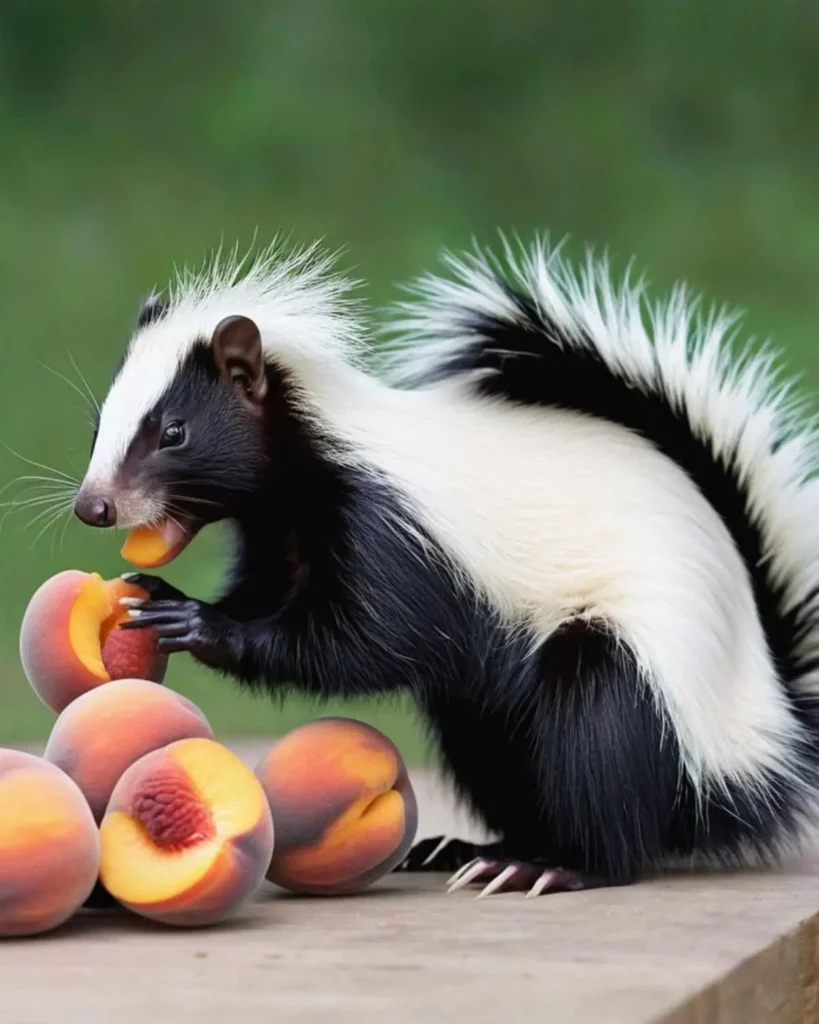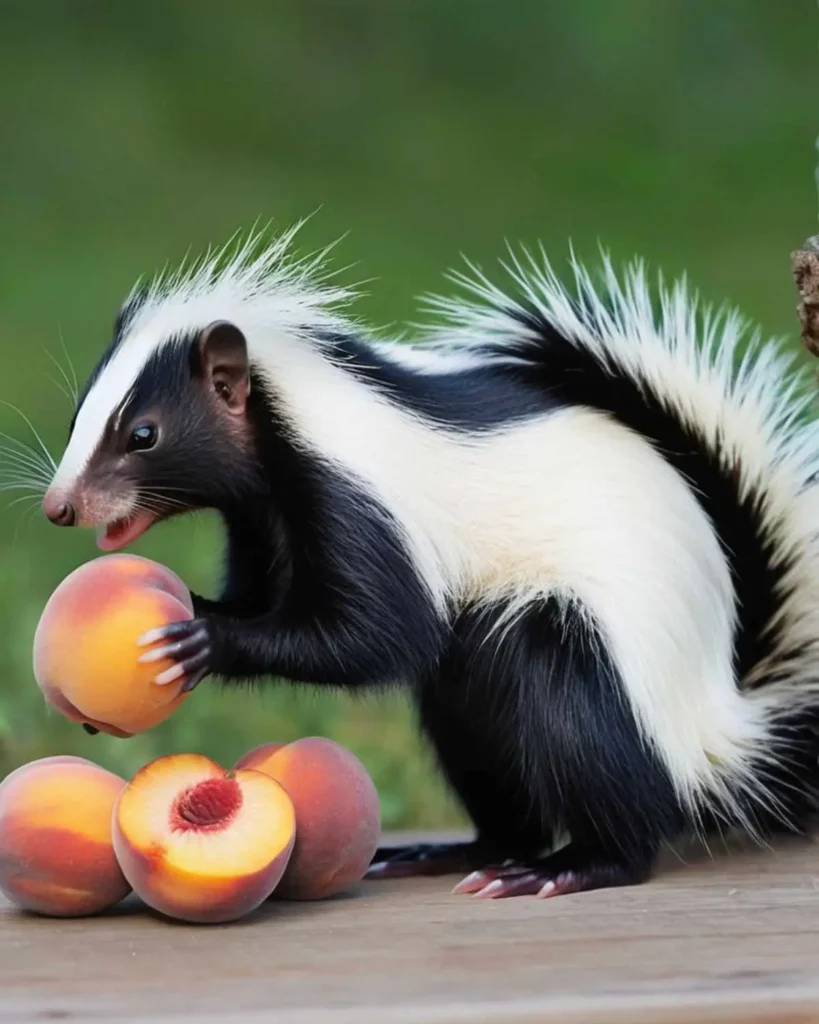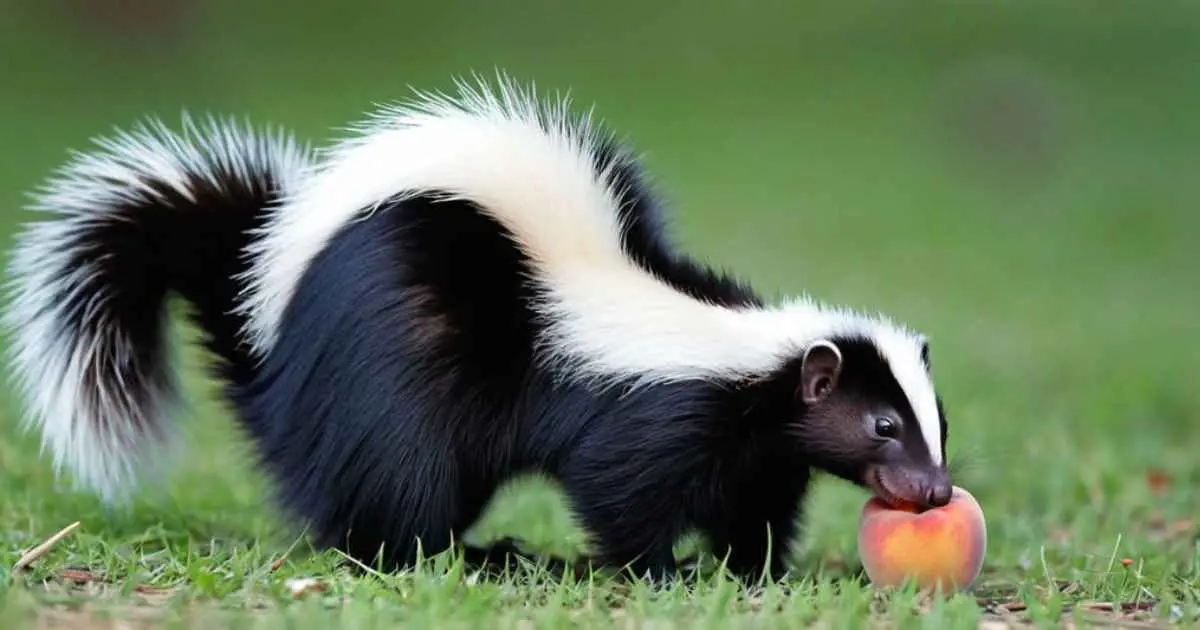Can Skunks Eat Peaches? Vet-Reviewed Facts & Precautions
Last updated on August 11th, 2024 at 07:32 am
Yes! As someone who has a pet skunk and has done lots of research, I can tell you that skunks are big fans of peaches. They love more than just bugs and small critters; they also have a taste for sweet fruits. Keep reading to learn why skunks eat peaches and how they fit into their diet.
Skunk Dietary Habits
Imagine a skunk on a fruit mission. One surprising fact about skunks is that they often find fruits like peaches irresistible. Skunks boast a diverse palette that drives their foraging adventures. They don’t confine themselves to a strict diet. In this exploration of what skunks eat, we’ll uncover not only their love for juicy peaches but also the wide range of other foods they enjoy throughout the seasons.
Omnivorous Appetites
Skunks are not picky eaters. They possess omnivorous appetites, meaning they consume both plants and animals. In the plant category, fruits like peaches are a favorite treat. They also munch on:
- Berries
- Cherries
- Nuts
Their animal-based diet includes:
- Insects
- Small rodents
- Earthworms
Skunks adapt their diet to what is available. This ability ensures they always find something to satiate their hunger, be it a crunchy insect or a soft peach.
Seasonal Eating Patterns
Skunks tweak their diets with the changing seasons. Fruits like peaches are summer delights when these treats are ripe and abundant. During spring and fall, they focus more on:
- Insects
- Grubs
- Larvae
The onset of winter sees skunks reducing activity and consuming fewer calories. They rely heavily on their fat reserves, often built up by autumn’s bounty of fruits and nuts.
Understanding seasonal patterns is key for skunks to thrive. It is also essential for gardeners looking to protect fruits like peaches from these furry visitors.
Fruit In A Skunk’s Diet
Do skunks fancy feasting on peaches? You might not envision these fluffy-tailed creatures nibbling on fruit. But truth be told, skunks are not strict meat-eaters. Their diet is quite the variety show, featuring different tasty treats from nature’s basket.

Natural Preferences
Skunks showcase a fondness for foods that Mother Nature provides. Fruits often make up a good part of their diet. Berries, fallen fruit, and insect-riddled produce provide them with a surprising feast.
- Plums
- Apples
- Peaches
- Cherries
Nutritional Value For Skunks
When we think of skunks, it’s not just their distinctive odor that comes to mind. These creatures need nutrients to thrive, just like any other animal.
Here’s what fruit brings to their plate:
| Nutrient | Benefit |
|---|---|
| Vitamins | Builds a robust immune system |
| Fiber | Helps with digestion |
| Sugars | Provides quick energy |
| Water | Keeps them hydrated |
Skunks are not only after the sweetness of peaches but also the hydration and nourishment these fruits offer.
Peaches On The Menu
Peaches on the Menu: It’s not just humans who love the soft, juicy allure of peaches; other creatures, including skunks, often find this fruit irresistible. Exploring a skunk’s diet reveals a surprising variety, with peaches sometimes finding their way onto the menu.
Skunks And Soft Fruit
Skunks have a varied diet, often marked by an affinity for soft fruits:
- Seasonal favorites: They indulge in succulent fruits like berries and figs.
- Natural foragers: Skunks often search for naturally occurring, easy-to-eat foods.
Peaches As A Food Option
Do skunks eat peaches?
| Food Type | Part of Skunk’s Diet? |
|---|---|
| Peaches | Yes, when accessible and ripe |
Peaches offer a nutritious snack:
- High appeal: Their soft flesh is easy to bite into.
- Nutrient-rich: Peaches provide energy and sustenance to skunks.
The Role Of Smell And Taste
In the animal kingdom, smell and taste are crucial for survival. Skunks, with their keen senses, seek food that appeals to both these senses. Peaches, with their sweet scent and juicy taste, can be irresistible to skunks.
Skunks: Scent-driven Foragers
Skunks are nocturnal creatures, relying heavily on their sense of smell to find food in the dark. Their highly developed olfactory senses lead them to a variety of foods, including fruits like peaches.
- Fruit scents guide skunks to potential food sources.
- Skunks have a varied diet but are drawn to strong, sweet smells.
- Their foraging behavior is primarily guided by scent.
Attractiveness Of Peaches
Peaches emit a robust aroma that can attract skunks from afar. The fruit’s firm flesh and sweet juice provide a taste sensation that skunks seek.
| Aspect of Peaches | Attractiveness to Skunks |
|---|---|
| Aroma | Can be detected from a distance |
| Texture | Appealing firm flesh |
| Taste | Desirable sweetness |
Skunks often eat peaches during the summer months. Their powerful smell and taste receptors make peaches a preferred choice among backyard fruits.
Potential Risks And Benefits
Sweet and juicy peaches can tempt not just humans but forest inhabitants too. Skunks, with diverse diets, might stumble upon these fruits. But are peaches safe for them?

Health Implications For Skunks
In small quantities, peaches can offer skunks vitamins and hydration. The natural sugar in the fruit provides quick energy. However, too much might lead to:
- Upset stomachs due to high sugar content
- Peach pits contain cyanide, which is harmful
- Digestive issues from excess fruit consumption
Ultimately, a balanced diet for skunks is essential, with fruits as occasional treats.
Possible Dangers Of Human Foods
Beyond the health of skunks, human foods can pose additional risks:
| Human Food | Risks to Skunks |
|---|---|
| Processed foods | Unhealthy additives and high sodium |
| Chocolate | Toxic to many animals |
| Caffeinated beverages | Can cause restlessness and heart issues |
Keeping human foods out of reach from wildlife prevents potential dangers.
Offering natural options from their environment ensures appropriate nutrition and minimizes risks.
Human-skunk Interactions
Our gardens often become feasts for wandering wildlife. Skunks, with their distinctive black and white fur, might visit to dine on available treats. Do skunks eat peaches? Yes, they do enjoy fruits like peaches occasionally. Understanding these nocturnal neighbors helps us live together peacefully.
Backyard Encounters
Imagine a cool evening, and you spot a skunk in your garden. Skunks often search for food at night. They might find ripe peaches fallen under your tree. Skunks have an excellent sense of smell. They use it to find fruits and bugs to eat.
Stay calm and quiet if you see a skunk.
- Do not startle them
- Keep a safe distance
- Never corner a skunk
These tips help avoid the famous skunk spray.
Minimizing Conflicts
Coexistence is key when sharing our space with skunks.
Secure your trash cans with tight lids. Pick ripe fruits promptly. This keeps skunks from being lured in.
Consider skunk-proof fences. These should be buried a few inches underground. This prevents skunks from digging under to enter your yard.
| Action | Benefit |
|---|---|
| Remove food sources | Less attraction for skunks |
| Use secure containers | Prevents tipping and spilling |
| Install proper fencing | Blocks entry points |
Keep pet food indoors. Cover compost piles well. These practices reduce skunk visits. Motion-activated lights or sprinklers can also help scare them away gently.
Wildlife Experts Weigh In
Curiosity often surrounds the diverse diets of skunks, particularly when it comes to fruity treats like peaches. Skunks are known for their eclectic eating habits, but do these black and white creatures fancy a peachy snack? Let’s reveal what wildlife experts have to say about this intriguing question.
Insights From Conservationists
Conservationists study wildlife behaviors closely. They have valuable insights into what skunks naturally prefer to eat. Typically, skunks are omnivorous. This means they enjoy both plants and animals. But what about peaches?
- Skunks are attracted to strong, sweet scents.
- Peaches can definitely entice them when found on the ground.
- Wild food sources vary by region and season.
Conservationists also note that skunks contributing to fruit consumption can have an impact on local ecosystems. They may play a role in seed dispersion for plants like peaches.
Advice From Veterinarians
Veterinarians care for skunks, both wild and domestic. They offer expert advice on skunk diets. A balanced diet for skunks consists of proteins, fats, and carbohydrates. But, what do they say specifically about skunks eating peaches?
- Skunks can eat peaches but in moderation.
- Peach pits can be harmful due to the presence of cyanide compounds.
- Always remove the pits before offering peaches to pet skunks.
Veterinarians stress that an excessive amount of fruits like peaches can lead to health issues for skunks, such as obesity and imbalances in nutrition. Professional advice should always guide skunk diets.
From the gardens to wild forests, skunks showcase flexibility in their diet, but with peaches, caution is advised. Respecting these guidelines ensures these fascinating creatures continue to thrive either in the wild or in our homes. The next time you spot a skunk, will it be amidst a peach feast? Only nature knows for sure.
Enhancing Skunk Habitats Naturally
Nature teems with life when we build homes for all its creatures. Skunks often roam our yards in search of food and shelter. Surprisingly, these black and white creatures do enjoy a juicy peach! Enhancing skunk habitats naturally involves thoughtful planting and creating welcoming spaces. Below are simple yet effective ways you can make your garden a haven for skunks and other wildlife, without compromising the beauty and functionality of your outdoor space.
Planting For Wildlife
Skunks have a varied diet that includes fruits, such as peaches. When you plant peach trees, you’re not just gearing up for a sweet summer harvest; you’re also providing a natural food source for skunks. But there’s more to a skunk-friendly garden than peach trees. Planting native shrubs and leaving spaces with natural ground cover can offer safety and nourishing snacks.
- Choose native plants that thrive in your local climate.
- Include layers of plant life, from ground covers to tall trees.
- Set up water sources like a bird bath or shallow dish.
Creating Skunk-friendly Spaces
Skunks need cover to feel safe in your yard. Log piles, leaf litter, and shrubs provide excellent hideouts. Spaces beneath your deck or shed can serve as cozy dens if properly enclosed to allow a safe way in and out. Always use humane practices to ensure the safety and health of both your family and the visiting wildlife.
| Feature | Benefits for Skunks |
|---|---|
| Native plants | Food and shelter |
| Water sources | Hydration and bathing |
| Brush piles | Shelter and protection |
Skunks are less likely to scavenge if they find natural food sources like peaches on your property. Regularly check and maintain these spaces to keep them welcoming and safe. A balanced ecosystem supports skunk populations and many other wildlife species, creating a vibrant, thriving environment right in your backyard.
Frequently Asked Questions
Skunks can safely eat various fruits including apples, bananas, melons, and berries. Offer these in moderation as part of a balanced diet.
Skunks should not eat chocolate, caffeinated beverages, alcohol, avocado, or onions, as these foods can be toxic to them.
Skunks primarily feast on insects, small mammals, fruits, nuts, and plants. Their favorite foods often consist of grubs and larvae.
Conclusion
Wrapping up, skunks do show a fondness for peaches, adding a surprising item to their varied diet. This preference is vital for gardeners to note in protecting their peach bounty. Keep in mind simple deterrents to maintain harmony between your fruit and the local wildlife.

